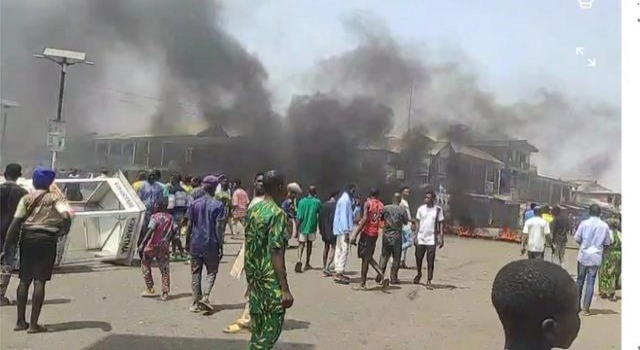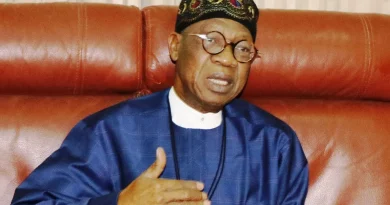Naira, Fuel Scacity: Riots break out in multiple Nigerian cities; Lagos begins distribution of palliatives to residents
Rioters attacked bank ATMs and blocked roads in multiple Nigerian cities on Wednesday as anger spilled on the streets over the scarcity of cash, officials and local media reported.
Nigeria has been struggling with a shortage in cash since the central bank began to swap old notes of the local naira currency for new ones, leading to a shortfall in banknotes.
Banks have limited access to cash thus impacting ATM withdrawals owing to the scarcity of the new notes while most businesses refuse to accept old naira, causing huge queues, angering customers, and disrupting businesses.
The unrest in southwest Ibadan, Benin City, and southern Delta for instance has resulted in varying degrees of destruction. Police in Delta State said “unguided youths/miscreants in the name of protests” set two banks and two vehicles on fire.
“We have arrested nine suspects so far. Some persons will still call this protest,” state police spokesperson Bright Edafe wrote on Twitter.
In Benin City, also in the south, protests broke out after police stopped “hoodlums” from attacking the central bank local office in the city, according to the Edo State governor’s spokesman Crusoe Osagie.
“The hoodlums then started attacking and vandalizing banks. They also blocked roads and forced businesses to close,” he said.
Angry customers also burned tires and blocked streets in the southwest Nigerian city of Ibadan, police and residents said.
Oyo State police said protests broke out in some parts of Ibadan, the state capital, early Wednesday, but were soon brought under control.
“There were pockets of protest this morning by some aggrieved bank customers,” spokesman Adewale Osifeso told AFP.
Local residents said the unrest started in Dupe, Mokola, Ogunpa, Apata, and Iwo Road areas when angry bank customers began protesting because they could not access their money or change old notes to new ones.
“Major roads were blocked while banks, shops, and other businesses were shut,” local journalist Remi Feyisipo told AFP.
The protest on Wednesday followed riots last week in the city where two people were killed in clashes, according to local media.
Tensions have flared in Nigeria since the central bank set a February deadline for depositors to change old notes, leaving many people cashless and frustrated.
Many people working in the informal economy and in transport in Nigeria use cash for transactions rather than banking apps.
Meanwhile, the Lagos State Government has commenced the distribution of palliative measures to vulnerable residents in fulfillment of Mr. Babajide Olusola Sanwo-Olu’s promise to cushion the effects of the hardship being experienced by Lagosians occasioned by the fuel scarcity and non-disbursement of currency by the banks.
Speaking at the launch and distribution exercise held today at Adeyemi-Bero Auditorium, Alausa Secretariat, Ikeja, Governor Sanwo-Olu said the distribution will be a continuous exercise as the government will be reaching out to religious centres, Non-Governmental Organisations (NGO), and other distribution channels across the State.
Sanwo-Olu, who was represented at the event by his deputy Dr. Obafemi Hamzat, said the targeted beneficiaries of the palliatives include the vulnerable and civil servants, among others, adding that the move is to alleviate the hunger that has been the outcome of currency redesigned by the Central Bank of Nigeria (CBN) and other crises associated with fuel scarcity.
In his words, “The purpose of the palliative is to cushion the biting effects of the current scarcity of Naira occasioned by the Central Bank of Nigeria’s (CBN) naira swap policy and the lingering fuel scarcity in the State”.
The Governor explained further that the measures became necessary to improve the living condition of the vulnerable residents of the State, saying “We are doing this to alleviate the pains and sufferings of Lagoaians. The distributed boxes contain different food items for the consumption of the vulnerable in the society”.
Earlier, the Commissioner for Women Affairs and Poverty Alleviation (WAPA), Mrs. Cecelia Dada stated that the Lagos State Government has put together the palliative measure for Lagosian, particularly the vulnerable residents in society.
Dada stressed that the present administration is mindful of the welfare of its people and that the challenges faced by citizens are due to the naira swap and difficulties being experienced in accessing their money at the banks.




